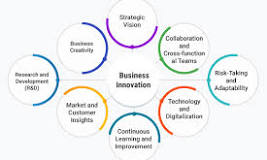Unveiling the Essence of Business Innovation: What Is Innovation in Business?

Understanding Innovation in Business
Innovation is a fundamental driver of success and growth in the business world. It involves the creation and implementation of new ideas, products, services, or processes that bring value to customers and differentiate a company from its competitors.
Business innovation can take many forms, including:
- Product Innovation: Introducing new or improved products to meet changing customer needs and preferences.
- Process Innovation: Finding more efficient ways to produce goods or deliver services, leading to cost savings and increased productivity.
- Business Model Innovation: Rethinking how a company creates, delivers, and captures value, often disrupting traditional industry norms.
- Marketing Innovation: Developing creative strategies to promote products or services and reach target audiences effectively.
- Organisational Innovation: Implementing changes in the structure, culture, or practices of a company to foster a more innovative environment.
Successful businesses understand that innovation is not just about generating ideas but also about executing them effectively. It requires a culture that encourages creativity, risk-taking, collaboration, and continuous learning.
In today’s fast-paced and competitive business landscape, companies that fail to innovate risk falling behind or becoming obsolete. Embracing innovation allows businesses to adapt to changing market conditions, stay ahead of trends, drive growth, and meet the evolving needs of customers.
Ultimately, innovation is about challenging the status quo, pushing boundaries, and striving for continuous improvement. By fostering a culture of innovation and investing in research and development, businesses can position themselves for long-term success in an ever-changing world.
7 Essential Tips for Fostering Innovation in Business
- Encourage a culture of creativity and openness to new ideas.
- Invest in research and development to stay ahead of the competition.
- Collaborate with external partners for fresh perspectives and expertise.
- Embrace technology to streamline processes and improve efficiency.
- Listen to customer feedback to identify areas for improvement and innovation.
- Empower employees to take risks and experiment with new solutions.
- Continuously evaluate market trends and adapt your strategies accordingly.
Encourage a culture of creativity and openness to new ideas.
Encouraging a culture of creativity and openness to new ideas is essential for fostering innovation in business. By creating an environment where employees feel empowered to think outside the box, share their innovative thoughts, and experiment with new concepts, companies can unlock a wealth of potential for growth and success. Embracing diverse perspectives, encouraging collaboration, and recognising and rewarding creative thinking can inspire a continuous flow of fresh ideas that drive business innovation forward.
Invest in research and development to stay ahead of the competition.
To stay ahead of the competition, businesses should prioritise investing in research and development as a key strategy for fostering innovation. By allocating resources to R&D efforts, companies can explore new ideas, technologies, and approaches that can lead to the development of innovative products or services. This proactive approach not only helps businesses anticipate market trends and customer needs but also gives them a competitive edge by continuously improving and differentiating their offerings in a rapidly evolving business landscape.
Collaborate with external partners for fresh perspectives and expertise.
Collaborating with external partners is a valuable strategy for fostering innovation in business. By engaging with individuals or organisations outside of your company, you can gain fresh perspectives, tap into diverse expertise, and access new ideas that may not have been considered internally. This collaborative approach can lead to innovative solutions, creative problem-solving, and the development of unique products or services that resonate with customers. Embracing external partnerships can enrich your business’s innovation ecosystem and help drive sustained growth and success in today’s dynamic marketplace.
Embrace technology to streamline processes and improve efficiency.
Embracing technology to streamline processes and enhance efficiency is a key aspect of innovation in business. By integrating cutting-edge tools and software solutions into operations, companies can automate repetitive tasks, reduce manual errors, and accelerate workflows. This not only saves time and resources but also enables employees to focus on more strategic and value-added activities. Embracing technology-driven innovations empowers businesses to stay competitive, adapt to market changes swiftly, and deliver superior products or services to customers.
Listen to customer feedback to identify areas for improvement and innovation.
Listening to customer feedback is a crucial practice for businesses seeking to innovate and improve. By paying attention to what customers have to say, companies can gain valuable insights into their preferences, pain points, and unmet needs. This feedback serves as a roadmap for identifying areas where innovation can make a real difference, whether it involves enhancing existing products or services, developing new solutions, or refining the overall customer experience. Customer feedback not only guides innovation efforts but also fosters stronger relationships with customers by demonstrating that their opinions are valued and acted upon.
Empower employees to take risks and experiment with new solutions.
Empowering employees to take risks and experiment with new solutions is a key aspect of fostering innovation in business. By creating a supportive environment where employees feel encouraged to explore unconventional ideas and try out innovative approaches, organisations can tap into the diverse talents and creativity of their workforce. Encouraging risk-taking not only leads to the discovery of new opportunities and solutions but also promotes a culture of continuous learning and improvement. When employees are given the freedom to experiment and learn from both successes and failures, they are more likely to contribute fresh perspectives and drive meaningful innovation within the company.
Continuously evaluate market trends and adapt your strategies accordingly.
In the dynamic landscape of business, it is crucial to continuously evaluate market trends and adapt strategies accordingly to foster innovation. By staying attuned to shifts in consumer preferences, emerging technologies, and competitive landscapes, businesses can proactively adjust their approaches to meet evolving market demands. This strategic agility not only enables companies to stay ahead of the curve but also opens up opportunities for creative solutions and disruptive innovations that drive sustainable growth and success.
